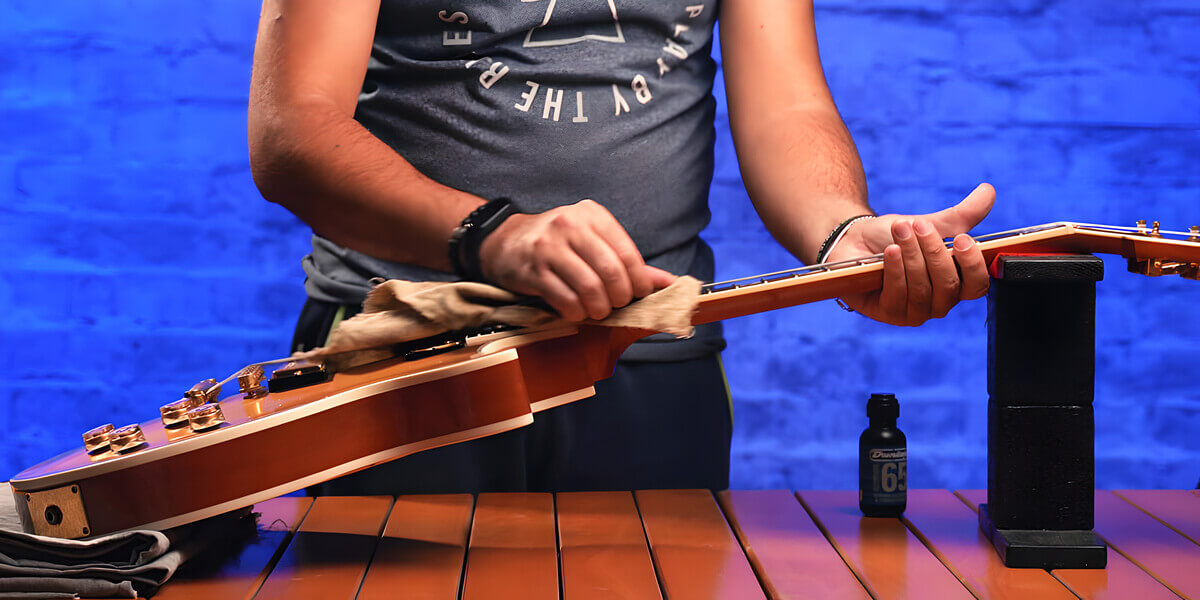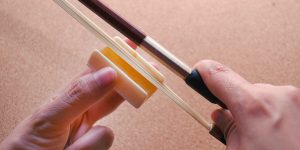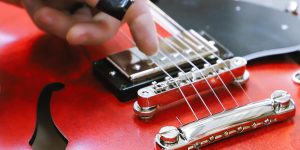The bass holds a foundational place, providing depth, rhythm, and resonance to a wide range of musical genres. An often overlooked yet pretty important element in achieving optimal sound quality and performance lies in maintaining clean bass strings. The accumulation of dirt, sweat, and natural oils during play can significantly impact tone and playability. I suggest exploring how to clean bass strings and factors that contribute to the buildup of contaminants on these essential components of the bassist’s toolkit.
Pre-cleaning preparations
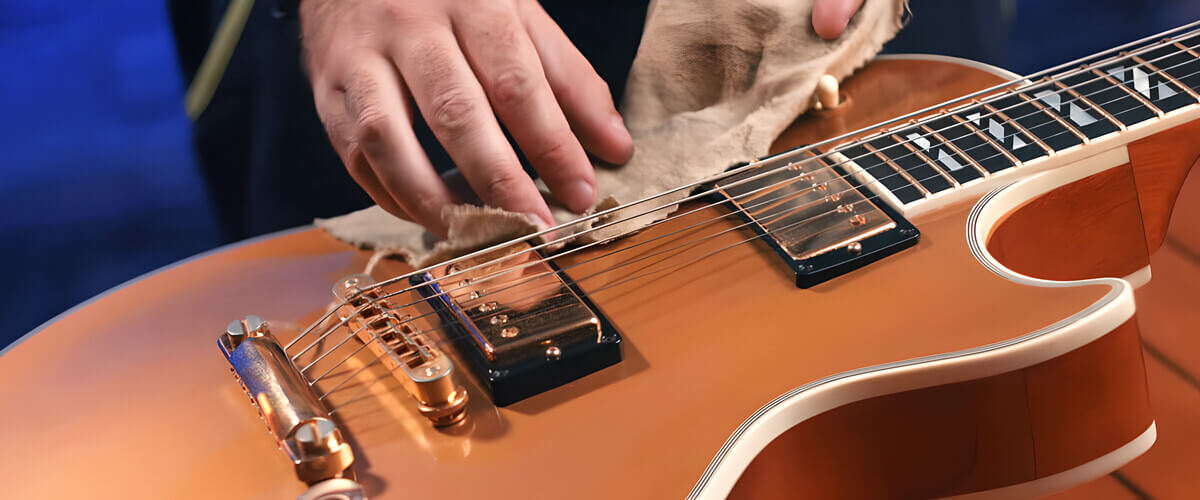
In the context of musical instruments like a bass guitar, these preparations are essential to ensure that the cleaning bass strings process is effective and safe. Here’s how pre-cleaning steps might be carried out for bass strings:
- Collect cleaning supplies such as lint-free cloths, string cleaning solutions, mild soapy water, and a soft brush.
- Check for any loose hardware, sharp edges, or other issues that might cause damage during cleaning.
- If you plan to remove the strings, consider loosening the tension gradually rather than detuning them abruptly.
- Lay down something soft to place the bass on. This protects the finish and keeps it stable during cleaning.
- Consider placing a thin piece of cardboard or plastic between the strings and the fretboard. This prevents any cleaning solution from inadvertently seeping into the wood.
- Read the manufacturer’s instructions and safety precautions for cleaning solution usage. It might require gloves or proper ventilation.
Cleaning process and different types of cleaning agents
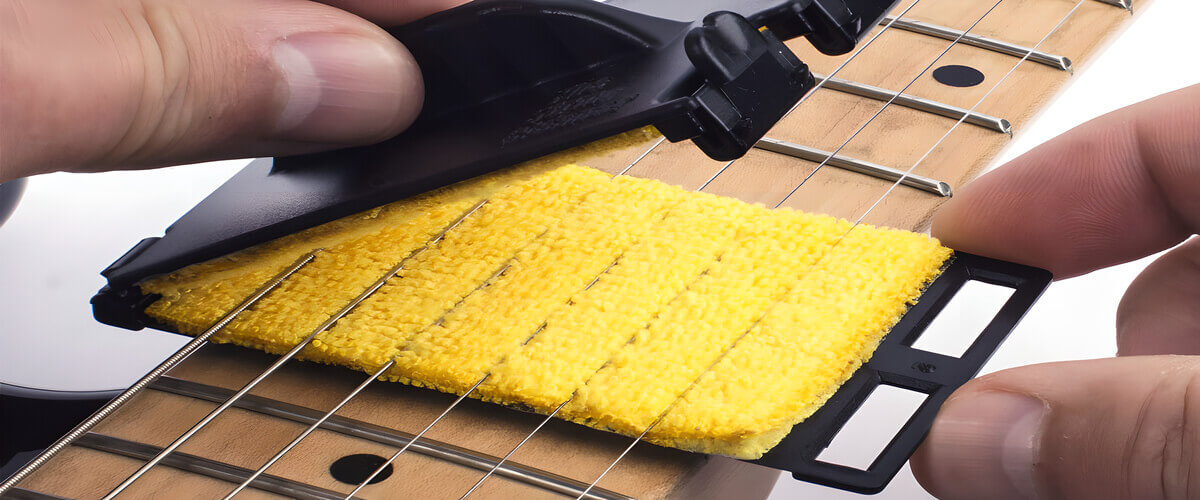
Once you’ve completed the pre-cleaning preparations, you can proceed with the cleaning process using various types of cleaning agents.
Types of cleaning agents
String cleaner. They usually come in spray bottles or applicator pads. They help restore brightness and prolong the life of the strings. To use, apply the solution to a cloth or directly onto the strings and gently wipe them down.
Isopropyl alcohol. It evaporates quickly and can effectively remove oils and dirt from the strings. However, it’s important to use it sparingly and avoid excessive use, as alcohol can potentially dry out the strings and affect their tone.
Lemon oil. This natural product can help remove dirt, grime, and stubborn residues from the fretboard surface. Additionally, it moisturizes the wood, preventing it from drying out and potentially cracking. Be cautious not to apply excessive oil, as too much moisture can be detrimental to the wood.
DIY vinegar solution. A homemade cleaning agent can be effective for removing stubborn residues and buildup from bass strings. You need to mix equal parts of distilled white vinegar and water. However, vinegar might have a slightly acidic nature that could potentially affect metal components if left on for too long.
Process of cleaning bass strings
As I’ve said before, cleaning bass strings can help maintain playability and extend their lifespan. Here’s a step-by-step process to effectively do it:
- Preparation. Set up a clean and well-lit workspace. Slightly loosen the tension of the strings.
- Dry wiping. Take a microfiber cloth or a clean, lint-free cloth and gently wipe each string from top to bottom. This removes light dust and debris.
- String cleaner. Apply a small amount to a cloth or applicator pad. Gently run the cloth along the length of each string, applying light pressure to remove dirt and sweat.
- Brushing. If there’s noticeable debris or buildup between the strings, use a soft brush to gently sweep away the dirt. Brush in between the strings and around the bridge area.
- Final wipe. Once you’ve done, take a clean, dry cloth and give the strings a final wipe to remove any remaining cleaning solution.
- Maintenance routine. Regularly wipe down your bass strings after playing to prevent excessive buildup.
Boiling bass strings. Who needs it and why?

Boiling is a technique used by some musicians to make any bass string cleaner and extend the life of old or heavily worn strings. While this method is not universally recommended, some players find it effective. Let’s explore who might need to boil bass strings and the reasons behind it.
Who needs it. If you are looking to improve the sound and playability of your strings without investing in a new set, it might be an option. Boiling is particularly popular among bassists who play styles where bright, crisp tones are less critical. Players who are experimenting with unconventional sounds may also try boiling strings to alter their tonal characteristics temporarily.
Why boil bass strings? Over time, accumulated dirt, sweat, and oils can dull the strings’ tone and responsiveness. Boiling breaks down and loosens these residues, potentially restoring some of the original brightness and playability of the strings. Additionally, boiling can slightly reduce tension, making the strings easier to play for a short period.
However, it’s important to note that boiling bass strings is not without its drawbacks and risks:
- might provide a temporary improvement;.
- can weaken the metal structure of the strings;.
- can alter the tonal characteristics of the strings;.
- risk of string breakage and damage to the finish.
How to boil bass strings?
If you decide to try this method, here’s a step-by-step guide on how to do it:
- Remove the old bass strings from your instrument.
- Boil water and add a small amount of mild dish soap.
- Carefully place the bass strings into the boiling water and leave them for 10-15 minutes. Remove the strings and put on a towel to dry.
- Once the strings have cooled, restring your bass guitar.
FAQ
How often should I clean my bass strings?
The frequency of cleaning bass strings depends on how often you play, your playing environment, and your personal preference. But it’s better to do it regularly, not when you experience a real deterioration in the tool’s performance.
Can I use water to clean bass strings?
It’s not recommended to use water to clean bass strings, as water can cause rust and corrosion on metal strings.
Can cleaning agents damage the fingerboard?
Certain cleaning agents, especially those containing harsh chemicals, can potentially damage the fingerboard or the finish of your bass.
How do I know if my strings need cleaning?
If you’re experiencing reduced brightness or clarity in tone, a visible buildup of grime, sweat, or oils on the strings, or discoloration or darkening, it’s time to clean your strings.

